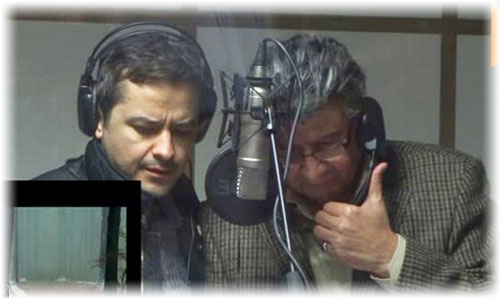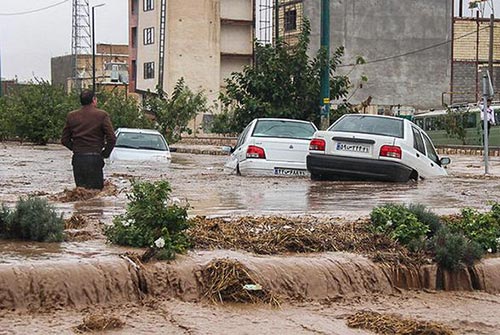flood
flood [flood floods flooded flooding] noun, verb [flʌd] [flʌd]
noun
WATER
1. countable, uncountable a large amount of water covering an area that is usually dry
• The heavy rain has caused floods in many parts of the country.
• flood damage
• Police have issued flood warnings for Nevada.
• an appeal to help flood victims
• the Thames flood barrier
• The river is in flood (= has more water in it than normal and has caused a flood).
see also flash flood
LARGE NUMBER
2. countable ~ (of sth) a very large number of things or people that appear at the same time
• a flood of complaints
• a flood of refugees
• The child was in floods of tears (= crying a lot).
IN BIBLE
3. the Flood singular the great flood that covered the world in the Bible story
• before the Flood (= a very long time ago)
Word Origin:
Old English flōd, of Germanic origin; related to Dutch vloed and German Flut, also to flow.
Thesaurus:
flood noun
1. C, U
• Rain caused floods in many areas.
flash flood • • torrent • • tidal wave • • tsunami • |especially written deluge •
cause a flood/flash flood/tidal wave/tsunami
floods/flash floods/a tidal wave/a tsunami hit/hits sth
a flood/tidal wave/tsunami destroys sth
2. C (usually followed by ‘of’)
• A flood of phone calls followed the broadcast.
stream • • barrage • • torrent • |written shower • • hail • • outpouring •
a flood/stream/torrent of words
a flood/stream of calls
floods/a torrent of tears
unleash a flood/barrage/torrent of sth
Example Bank:
• No one knew that the flood was coming.
• She was inundated by floods of fan mail.
• The fields were inundated by heavy floods.
• The flood caused widespread destruction.
• The floods are slowly subsiding.
• The little girl was in floods of tears.
• The river was in full flood.
• This summer the region was struck by devastating floods.
• Writing about St. John's brings back a flood of nostalgic memories.
• a great flood of refugees
• A great flood of anger washed through him.
• Authorities are struggling to cope with the flood of refugees.
• Conversation returned, a trickle breaking into a flood.
• The building was evacuated as flood water filled the basement.
• The insurance does not cover flood damage to gates, hedges or fences.
• They took on temporary workers in anticipation of a flood of calls.
Derived Words: flooded ▪ flooding
Derived: flood somebody out
verb
FILL WITH WATER
1. intransitive, transitive if a place floods or sth floods it, it becomes filled or covered with water
• The cellar floods whenever it rains heavily.
• ~ sth If the pipe bursts it could flood the whole house.
OF RIVER
2. intransitive, transitive to become so full that it spreads out onto the land around it
• When the Ganges floods, it causes considerable damage.
• ~ sth The river flooded the valley.
LARGE NUMBERS
3. intransitive ~ in/into/out of sth to arrive or go somewhere in large numbers
Syn: pour
• Refugees continue to flood into neighbouring countries.
• Telephone calls came flooding in from all over the country.
4. transitive, usually passive ~ sb/sth with sth to send sth somewhere in large numbers
• The office was flooded with applications for the job.
• We've been flooded with complaints.
5. transitive to become or make sth become available in a place in large numbers
• ~ sth Cheap imported goods are flooding the market.
• ~ sth with sth A man who planned to flood Britain with cocaine was jailed for 15 years.
OF FEELING/THOUGHT
6. intransitive, transitive to affect sb suddenly and strongly
• + adv./prep. A great sense of relief flooded over him.
• Memories of her childhood came flooding back.
• ~ sb with sth The words flooded him with self-pity.
OF LIGHT/COLOUR
7. intransitive, transitive to spread suddenly into sth; to cover sth
• + adv./prep. She drew the curtains and the sunlight flooded in.
• ~ sth She looked away as the colour flooded her cheeks.
• be flooded with sth The room was flooded with evening light.
ENGINE
8. intransitive, transitive ~ (sth) if an engine floods or if you flood it, it becomes so full of petrol/gas that it will not start
Verb forms:
Word Origin:
Old English flōd, of Germanic origin; related to Dutch vloed and German Flut, also to flow.
Thesaurus:
flood verb
1. I
• The river flooded, causing immense destruction.
overflow • • burst its banks •
a river floods/overflows/bursts its banks
2. I (always used with an adverb or preposition)
• Refugees continued to flood into neighbouring countries.
pour • • stream • • surge • |informal pile • |often disapproving swarm •
flood/pour/stream/surge/pile/swarm into sth
flood/pour/stream/swarm out of sth
come flooding/pouring/streaming in/out
Flood or pour? Flood places more emphasis on the large numbers of people or things involved; pour emphasizes that the action continues over a period of time.
Example Bank:
• The area near the river is liable to flood.
• The village had been badly flooded.
• Telephone calls came pouring/flooding in from all over the country.
• We've been flooded with complaints.




